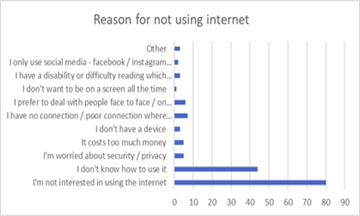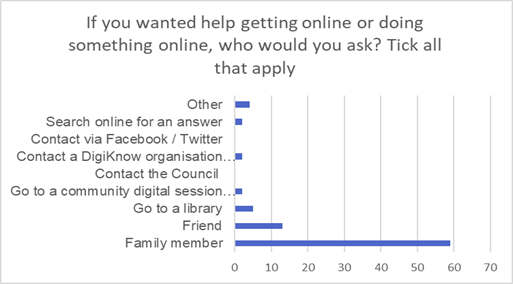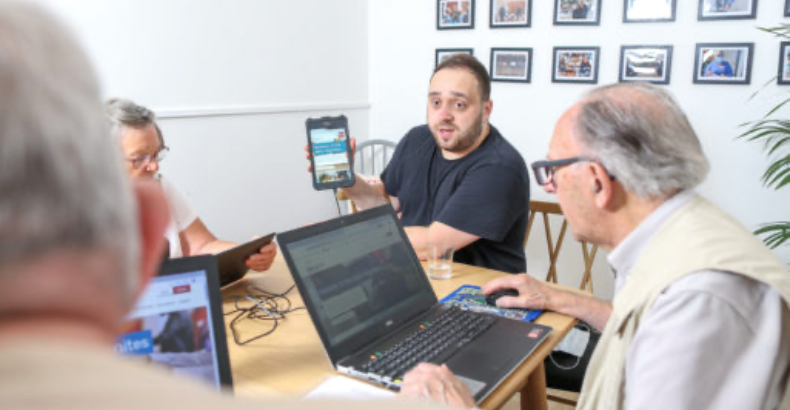Tanya King is Head of Customer Engagement and Inclusion at Stockport Homes Group, one of the core partners of the DigiKnow Alliance.
In my previous blog, I described the Greater Manchester Combined Authority (GMCA) Digital Pilot which has brought together internet service providers, social housing providers, including ourselves, and local authorities from across the region to tackle digital exclusion in social housing settings.
As part of the pilot, Stockport Homes conducted a large-scale survey of our tenants to really get to grips with the digital challenges they face. We spoke to over 500 tenants via a combination of phone calls, roadshow events and door-knocking.
We asked about internet access at home, reasons for using (or not using) the internet, how confident they were in their digital skills and where they would go for help getting online or doing something online. Here are some of the key findings.
Around 25% of respondents report never using the internet
We found that non-users are most likely to be over 56 years of age or have a disability or health condition and live in postcode areas SK2 (Offerton), SK4 (Four Heatons), SK6 (Bredbury, Romiley, Woodley, Marple, High Lane) or SK7 (Bramhall, Hazel Grove and Woodford), where there is a higher-than-average proportion of older tenants who have a pension as their main income.
Reason for not using the internet
By far, the most frequently cited reasons for not using the internet were ‘I’m not interested in using the internet’ and ‘I don’t know how to use it’.

Internet use varies widely among those who are online
It is not simply a case of people being ‘on’ or ‘off’ the internet. When comparing those who are online, older residents, and those with poor health, have poorer digital skills and take part in a much more limited range of activities when they do use the internet than other households.
Almost 70% of usage by older people is social rather than transactional, i.e. less likely to do online banking, contact organisations about health etc or apply for services. 15-20% of older adults have not engaged with local online services, including local health care, events and contact with neighbours.
This compares to only 3-11% of younger adults stating they do not engage with these local services online.
Almost half of those surveyed have no device or rely on a smartphone
28% of respondents have no device to access the internet. 17% rely on their smartphone as their only device, much higher than the UK average of under 10%.
Of those who do have devices, smartphones and tablets are the main devices being used. Households with children are far more likely to have a smartphone, smart TV or laptop, although 17% only have a smartphone.
53% of respondents have a laptop or PC, compared with a UK average of 74% (Source: Ofcom tech tracker).
Around one-third of those online are reliant on mobile data packages, not broadband
Households with children are slightly more likely to have broadband/wifi but are more likely to access the internet using a mobile phone on wifi, rather than a laptop or tablet.
Across all age groups, there is an equal split between PAYG and 24-month contracts. However, households with children are more likely to be on 24-month contracts than PAYG.
Younger people and households with children are more likely to have larger (40GB+) data packages; older people are more likely to have smaller ones.
Social Tariffs
There was very low awareness of or interest in social tariffs (discounted price plans for people who receive government benefits). 51% of respondents were not interested in a social tariff. Of those who are offline and eligible for a social tariff, the majority (88.2%) are not interested.
Those who were interested are more likely to be under 36 years old and more likely to have children. Interest in social tariffs does not seem related to how much people currently pay for broadband or the devices used.
There were lots of reasons given for not wanting a social tariff, but the three main ones are:
- Happy with their current situation – including smartphone only
- Don’t want the internet at home at all
- Would want more services than the very basic package
When questioned on budgets, Stockport tenants do not want to pay more than £15 for a social tariff.
Digital skills support
The majority of respondents using the internet were confident in their digital skills. Most would go to a family member or friend if they needed help getting online or doing something online.

What are we doing with this information?
As one in four respondents said they never use the internet, we are making sure that information continues to be provided in a range of ways, such as letters, posters, on screens in blocks and via text or telephone wherever possible. We will engage with older and disabled customers, in particular, to ensure they have accessible routes into our services.
We already have free digital skills sessions across Stockport to support those who said they don’t use the internet because they don’t know how to and we will continue to offer these. Call 0161 494 9947 or ring/ text the DigiKnow Helpline on 07724 217888 for details of all sessions.
With so many relying on mobile phones for using the internet, we are pushing out information about device loans and affordable tablets and laptops available through DigiKnow partners.
Throughout the survey, we can see older people are less likely to use the internet and that they use it in a more limited way. We are already working with our Independent Living service to engage with older customers to better understand their digital use. We will be particularly targeting older tenants in postcode areas SK2, 4, 6 and 7, working in partnership to develop digital skills and provide affordable equipment in a way that best suits them.
For regular updates from the #DigitalStockport blog, sign up for email alerts.

